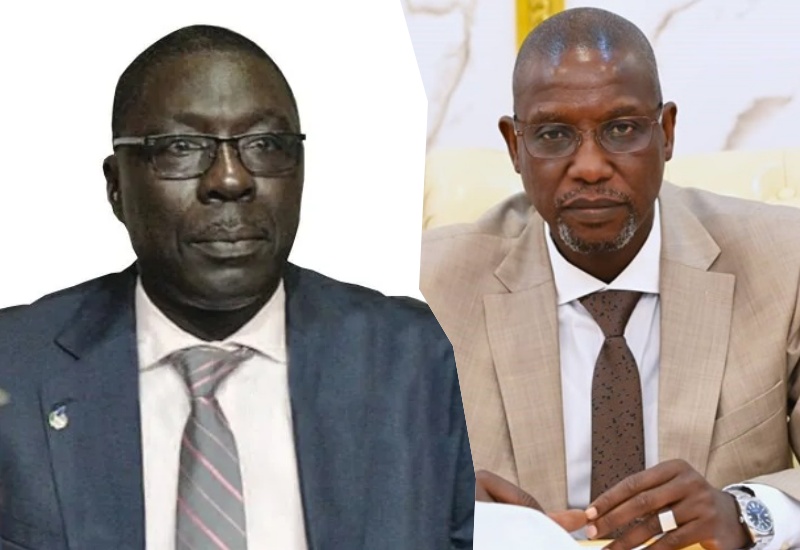Gambiaj.com – (BANJUL, The Gambia) – A joint investigation by the Gambia’s Public Finance Accounts Committee (FPAC) and Public Enterprise Committee (PEC) has unearthed damning evidence of misconduct, regulatory failures, and deliberate institutional complicity surrounding the controversial importation and sale of petroleum products by a Russian-linked company, Apogee FZC.
The parliamentary probe, launched in July 2024 following a motion by Representative Sainey Jawara, focused on how approximately 36,935 metric tons of petroleum—valued at over US$30 million—entered the country under questionable circumstances.
The key players involved were Apogee FZC, Creed Energy Ltd., and Ultimate Beige Logistics. The findings, tabled this week before the National Assembly, have now triggered calls for wide-ranging sanctions and accountability measures across government and the private sector.
Who Helped the Russian Company and Why Some Ministers Face Censure
At the heart of the report is the revelation that Apogee FZC was allowed, through an alleged “government policy,” to offload and store fuel at Gam Petroleum’s depot—effectively monopolizing the domestic oil market at the expense of established local marketers.
This strategic foothold enabled the Russian company to dominate fuel distribution and force oil marketing companies to switch suppliers, incurring significant financial losses in the process.
However, the report found no evidence that this so-called policy was ever approved by the Cabinet. Minister Abdou Jobe—then petroleum minister and now minister of tourism—claimed the decision had Cabinet backing, but the committee concluded that he “may have committed misconduct in office” by instituting a policy without due process.
Gam Petroleum’s General Manager, Yoro Jallow, was also singled out for playing an active role in supporting Apogee’s operations, allegedly acting as their agent and introducing them to local oil marketers.
The committee found that he provided false testimony before parliament and recommended his immediate suspension and prosecution for perjury.
Minister Jobe is not the only official in the firing line. Former Inspector General of Police (IGP) Abdoulie Sanyang, now Minister of the Interior, is also facing a recommended vote of censure. He is accused of interfering in police investigations and prematurely halting inquiries triggered by a Financial Intelligence Unit (FIU) report.
Sanyang’s handling of the case involving the principal suspect, Lithuanian national Aurimas Steiblys—who was briefly detained and later fled the country—was found to be highly questionable.
Although he claimed to have only learned of the FIU report through informal channels, documents showed he had formally minuted the report to the police’s Special Investigation Unit and had been contacted by Minister Jobe regarding Steiblys’ arrest.
The report notes that Sanyang failed to maintain command responsibility and gave contradictory accounts to the committee, warranting the initiation of censure proceedings.
The commander of the Special Investigation Unit, Pa Alieu Jawara, is also under scrutiny, with a recommendation that the Attorney General investigate his conduct during the FIU-led probe.
Institutional Failures and Complicities That Include Legal Professionals
The report paints a broader picture of systemic failures and collusion across key institutions. It recommends the executive hold the heads of the Gambia Ports Authority, Central Bank, and the police accountable for inaction in response to the FIU’s early warnings.
Regulatory bodies, including the Public Utilities Regulatory Authority and Gambia Revenue Authority, were also cited for failing in their oversight duties.
Ecobank and Access Bank Gambia were found to have breached banking compliance protocols by allowing the establishment of bank accounts for Apogee FZC and Ultimate Beige Logistics without proper due diligence. Both institutions enabled Aurimas Steiblys to operate as the sole signatory to significant company accounts, facilitating illicit financial flows offshore.
In an unusual move, the committee recommended disciplinary action against legal professionals. Prominent lawyer Haddy Dandeh Njie-Jabbie, who served as company secretary for Apogee Gambia Ltd., was accused of negligence and facilitating a virtual board meeting that led to suspicious fund transfers.
The General Legal Council has been urged to reprimand her and investigate whether another legal practitioner, state counsel Sohna Jawara, breached ethics by drafting documents for Ultimate Beige Logistics without adequate oversight.
Next Steps and Broader Implications
The committee has proposed a sweeping set of remedial actions, including an immediate suspension and investigation of key officials, dissolution of Ultimate Beige Logistics via High Court petition, striking Apogee Gambia Ltd. from the Companies Register, sanctions on banking institutions and legal actors, and a full inquiry into the true beneficial ownership of Creed Energy and whether local actors served as proxies for foreign interests.
These recommendations, if adopted, could mark a significant turning point in accountability and regulatory reform in The Gambia’s petroleum sector.
The scandal also exposes how weak governance frameworks and opaque decision-making processes can enable foreign entities to manipulate national markets—often with the help of public officials.
As the executive deliberates its response, public scrutiny will likely intensify over whether the Barrow administration will act decisively against its own ministers and allies. The case may well become a litmus test for the government’s commitment to transparency and rule of law.










